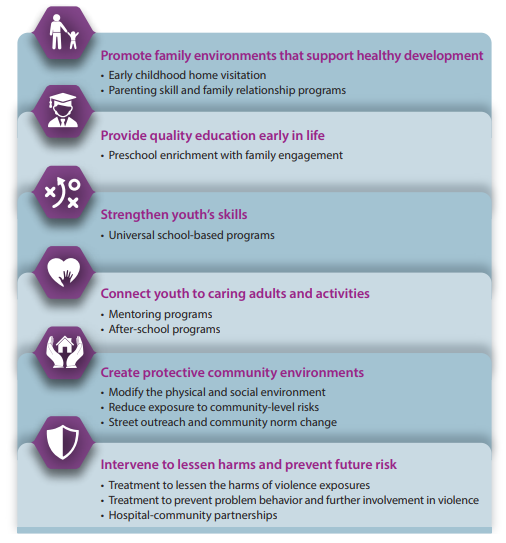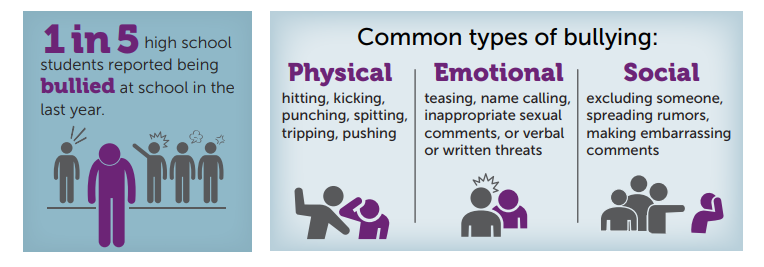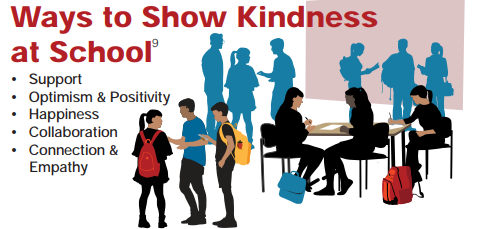Information for Parents
If you know or suspect your child is being bullied, knowledge is power.

- Know the warning signs of bullying. In many cases, when a child is being bullied, they won’t seek help from their parents or other authority figures. This is why it’s vital to know the signs. Talk with your child if you suspect bullying may be occurring. Encourage your child to talk openly.
- Understand the difference between bullying and other types of aggressive behaviors. Different behaviors may require different responses in dealing with the situation. You can learn about different types of aggressive behaviors here.
- As stated above, knowledge is power. Know who is at a greater risk of being bullied, what to do if your child is exhibiting signs of being the bully, and what the consequences of bullying are (for the aggressor and the victim).
- Seek information on the different types of bullying. Traditionally, bullying happens face-to-face. Nowadays, technology has made the instances of cyberbullying increase, has made bullying easier to do, and has made the bully bolder, taking bullying to a greater degree. Learn about cyberbullying and its effects here. Often, cyberbullying requires a different response than face-to-face bullying.
- Learn how to communicate with your child about bullying. If you need advice on how to keep the lines of communication open, resources are available to learn best practices. You can also seek the advice of a school counselor or attend counseling sessions to utilize a third-party approach to opening the lines of communication.
- If you find out or suspect your child is being bullied, contact the school and other community agents to discuss next steps. Educate yourself about the different anti-bullying state and federal laws your child is protected under.
Information for Teachers
Schools are classic grounds for bullying. It’s important to maintain an inclusive, supportive, and safe environment for all students. If you know or suspect a student is being bullied, the following resources can help.

- Understand what bullying is and what to look for in bullying. It’s just as important to understand what does not constitute bullying as what does. Different responses are needed for different situations.
- Learn what types of students are more prone to bullying. And learn about the effects bullying has on students.
- Respond immediately to any bullying situation. Listen when students report to you that another child is being bullied. Research the situation, even if you did not witness the behavior yourself.
- Take advantage of all resources provided to teachers and staff from education administrators. Learn from training and other anti-bullying campaigns on how to recognize and take action against bullying.
- Establish a safe environment for students. Open lines of communication between students, parents, and the school. If you witness or suspect a bullying situation, make an action plan and get the right people involved.
- Talk to your students about bullying. Educate them on what types of behavior are okay and what types of behavior are not okay. Let them know what a safe school environment means. Encourage them to speak up if they are being bullied or if they witness bullying.
- Understand the state and federal anti-bullying laws.
Information for Students
If you are a student and are being bullied or are witnessing another student being bullied, take action!

- Let an adult know about the bullying. The sooner the better. It’s important to talk about your feelings and how the bullying made you feel. Talking to an adult that you trust (e.g., your teacher or your parents), can help you figure out a plan to stop the bullying.
- If you know a certain individual is a bully or that bullying typically occurs in certain places, stay away from those places and from those people who bully.
- If you are nervous about a bullying situation occurring, stay near an adult. Most children won’t bully another student around adults.
- Understand safety while using technology. Cyberbullying is a real thing. Use social media responsibly. Keep your passwords private. If you are the victim or a witness in cyberbullying, don’t engage in any conversation online where bullying is occurring.
- If you witness another student being bullied, tell your parents, tell your teachers. Stand up for them. They might be in a position where they cannot seek help. Be a friend and seek the help for them.
- If you know a student who is being bullied, be nice to them. They are probably feeling pretty down and having a friendly face to talk to can help them know they are not alone. Sit with them at lunch, invite them over to your house, say hello to them in the hallways.